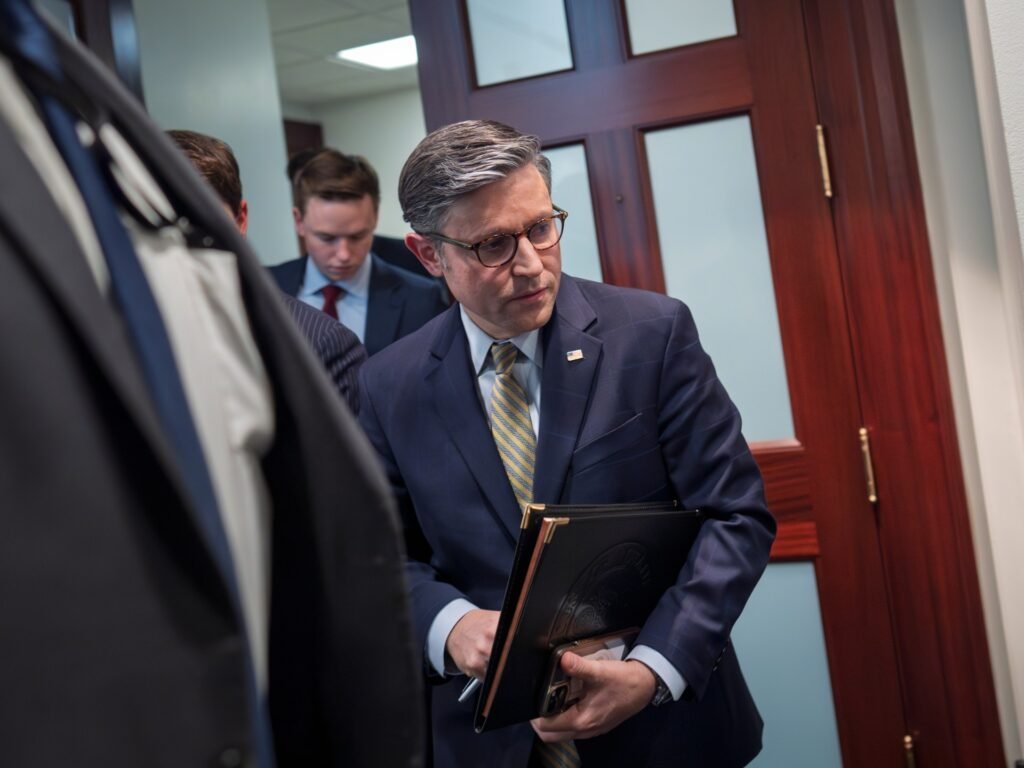A Last minute budget bill A bill was passed in the United States House of Representatives that would maintain funding and operations of the federal government until mid-March, averting an impending shutdown.
The continuing resolution now heads to the Senate, with just a few hours left until the shutdown is scheduled to take effect at 12:01 a.m. local time (05:01 GMT) on Saturday.
On Friday evening, the interim budget bill was passed with an overwhelming majority of 366 votes in the House of Representatives.
Only 34 representatives, all Republicans, voted against the bill. One Democrat, Rep. Jasmine Crockett of Texas, abstained by voting “present.”
“We are truly grateful to have passed the American Relief Act of 2025 with an overwhelming bipartisan vote tonight,” House Speaker Mike Johnson said in a news conference after the vote.
But the stopgap bill ignored a key issue that had stalled recent negotiations: the debt ceiling.
Normally, Congress weighs federal spending separately from the debt ceiling, which limits how much the government can borrow.
But this week, President-elect Donald Trump defeated an earlier bipartisan bill in part because it neither extended nor eliminated the debt ceiling, which he likened to a “guillotine” hanging over his new administration.
The debt ceiling has become a contentious issue among Republicans, some of whom feared that extending or eliminating the debt ceiling would pave the way for unrestricted government spending.
Trump, for his part threatened to provide priority challenges to any Republican who opposed his plan. He signaled that he preferred the debt ceiling debate to take place under the outgoing administration of President Joe Biden, a Democrat and his former election rival.
“If Democrats don’t lift the debt ceiling now or significantly extend it, I will fight to the end,” Trump said in a letter Social media post on Wednesday. “This is an evil TRAP set by the Radical Left Democrats! They want to embarrass us in June when it comes to the vote.”
Trump’s resistance to this week’s bipartisan legislation brought him into conflict with Johnson, another top Republican leader. Johnson’s predecessor as speaker, Republican Kevin McCarthy, was ousted last year in a historic vote over his role in passing a bipartisan spending bill.
After the first bipartisan bill was defeated on Wednesday, Trump supported it another version that failed in the House of Representatives a day later, on Thursday. All Democrats and 38 Republicans opposed it.
Friday’s bill succeeded in restoring Democratic support after closed negotiations. In his remarks after the vote, Johnson tried to portray the latest spending deal as a victory for Trump’s “America First” economic program.
“This is America First legislation because it allows us to take care of the American people,” Johnson said.
He also hinted that there will be changes in January when a new Congress is sworn in and Donald Trump takes office for a second term. If that happens, Republicans will have a majority in both houses of Congress.
“In January we will make a fundamental shift in Washington,” Johnson said. “Things will be very different here. This was a necessary step to close the gap and get us to the moment where we can leave our fingerprints on 2025 spending.”
Like previous bills, the temporary stopgap passed Friday includes about $10 billion in farm aid and $100 billion in disaster relief, a priority after the devastation caused by hurricanes like Helene and Milton.
But the saber rattling that had accompanied an earlier version of the bill had largely subsided by Friday evening, and Trump allies like billionaire Elon Musk struck a conciliatory note.
Musk, who called a version of Wednesday’s bill “criminal,” praised Speaker Johnson for streamlining the legislation after Friday night’s vote.
“The speaker has done a good job here given the circumstances,” he said wrote on his social media platform X. “It went from a bill that weighed pounds to a bill that weighed ounces.”
Democrats, meanwhile, questioned Musk’s growing influence over the Republican Party. Musk is expected to advise Trump’s new administration in a new role, as part of a non-governmental, yet-to-be-established agency called the Department of Government Efficiency.
“Obviously Donald Trump didn’t get what he wanted,” Rep. Jared Moskowitz of Florida told reporters as he walked down the steps of the Capitol. “It looks like Elon got some of the things he wanted. So that’s interesting.”
Moskowitz praised Democrats for giving Republicans the majority needed to pass the bill in the House despite internal disagreements within the right-wing party.
“The drama that has unfolded here over the last two days did not have to happen,” he said. “And we literally ended up in the same place we would always end up, which is the place where Democrats had the majority of votes to keep the government open and deliver for the American people. “





